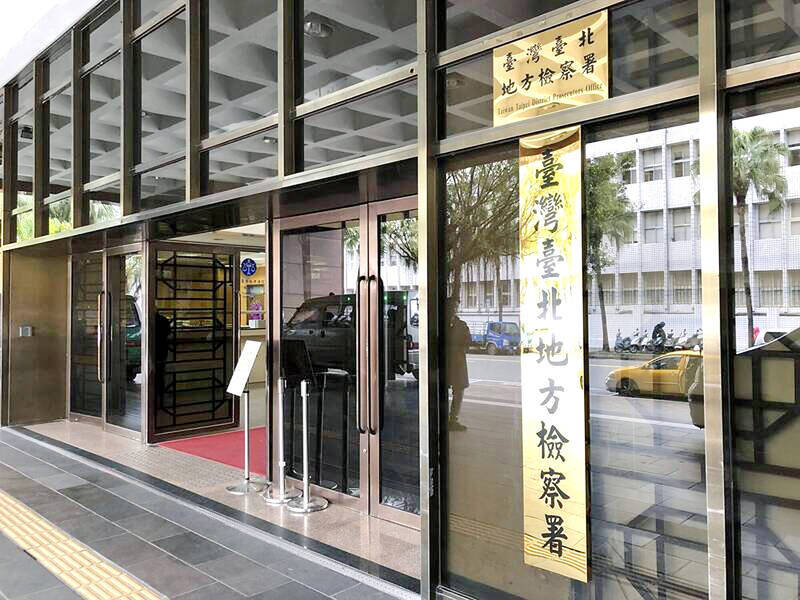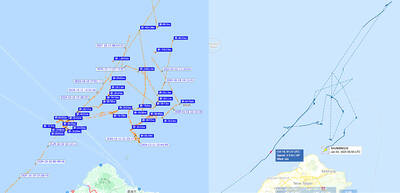The Taipei District Prosecutors’ Office yesterday filed to appeal the acquittal of former Chinese national Ho Jianghua (何建華), accused of setting up a spying network for China.
Ho was indicted in 2020, allegedly receiving funding and working on espionage activities for China, but was acquitted by the Taipei District Court in its first ruling in February.
The district court’s acquittal on the basis of “freedom of speech” was flawed, prosecutor Lin Ta (林達) wrote in the appeal, adding that it did not assess the clear danger she posed to national security and did not take her actions into account.

Photo: Screen grab from Facebook
Those actions include holding meetings in Beijing, receiving more than NT$400,000 in funding from the Chinese United Front Work Department, evidence of engaging in espionage, collecting personal information and subverting Taiwan’s democratic system.
The acquittal did not examine her efforts to develop a network for the Chinese government and the judge detached this portion presented in the indictment, Lin said.
In doing so, the court judge nullified the application of Article 2 of the amended National Security Act (國家安全法), which prohibits the “funding, hosting ... directing or developing an organization” for a hostile foreign state, he added.

Photo: Taipei Times
An investigation showed that Ho had established an organization for Chinese women and spouses living in Taiwan, drafted its charter and working programs, and led members in a visit to Beijing where they reported to Chinese officials and agreed to become a Chinese government-affiliated organization, Lin said.
The appeal said that Ho headed the organization, set up channels for funding from Beijing and initiated plans to execute several programs, one of which was to “identify personal details of Chinese nationals living in Taiwan” and “track their activities.”
Ho was supported financially by Beijing for these efforts and it helped fund events in Taiwan that aimed to entice Chinese nationals to attend, including Chinese spouses who have become Taiwan citizens, it said.
“Through these efforts and events planning, Ho would contact and recruit Chinese nationals in Taiwan to become members and work for her, further developing her organization. One of their programs was to collect personal details and sensitive information, and to report on those who are supporting Taiwanese independence,” Lin said.
Ho also instructed members to attend rallies and support certain parties and candidates during election campaigns, she said.
“Overall, from the evidence and observation of these activities, it can be deemed that [Ho] has contravened Article 7 of the National Security Act’s ‘intends to endanger national security or social stability’ on behalf of China,” he said.
“Based on an objective assessment, Ho had initiated, funded and arranged her organization in a way that leads to ‘clear and immediate danger’ to undermine Taiwan’s national security and social stability ... therefore, the district court’s ruling is flawed,” Lin said.
“Through the appeal, we can also use this case to start a legal discourse on the boundaries between national security and freedom of speech, and to clarify the requirements of ‘developing an organization’ on behalf of a hostile foreign state,” he said.
It is important to differentiate it from “freedom of speech,” a basic right protected under the Constitution, he said.
The justice system should have an accurate understanding of its fundamental principle and should not be used to protect every unlawful action, he added.
“In Taiwan, our citizens have freedom of speech, by which a person can, in political discourse, advocate for ‘unification with China.’ However, the person’s intent and actions must not amount to ‘colluding with China or other hostile states, in conspiring to destroy our nation’s political system as a democratic republic,’” he said.
“The courts must refrain from abusing the concept of ‘freedom of speech’ to grant an acquittal,” Lin said.

DEEPER REVIEW: After receiving 19 hospital reports of suspected food poisoning, the Taipei Department of Health applied for an epidemiological investigation A buffet restaurant in Taipei’s Xinyi District (信義) is to be fined NT$3 million (US$91,233) after it remained opened despite an order to suspend operations following reports that 32 people had been treated for suspected food poisoning, the Taipei Department of Health said yesterday. The health department said it on Tuesday received reports from hospitals of people who had suspected food poisoning symptoms, including nausea, vomiting, stomach pain and diarrhea, after they ate at an INPARADISE (饗饗) branch in Breeze Xinyi on Sunday and Monday. As more than six people who ate at the restaurant sought medical treatment, the department ordered the

A strong continental cold air mass and abundant moisture bringing snow to mountains 3,000m and higher over the past few days are a reminder that more than 60 years ago Taiwan had an outdoor ski resort that gradually disappeared in part due to climate change. On Oct. 24, 2021, the National Development Council posted a series of photographs on Facebook recounting the days when Taiwan had a ski resort on Hehuanshan (合歡山) in Nantou County. More than 60 years ago, when developing a branch of the Central Cross-Island Highway, the government discovered that Hehuanshan, with an elevation of more than 3,100m,

Taiwan’s population last year shrank further and births continued to decline to a yearly low, the Ministry of the Interior announced today. The ministry published the 2024 population demographics statistics, highlighting record lows in births and bringing attention to Taiwan’s aging population. The nation’s population last year stood at 23,400,220, a decrease of 20,222 individuals compared to 2023. Last year, there were 134,856 births, representing a crude birth rate of 5.76 per 1,000 people, a slight decline from 2023’s 135,571 births and 5.81 crude birth rate. This decrease of 715 births resulted in a new record low per the ministry’s data. Since 2016, which saw

SECURITY: To protect the nation’s Internet cables, the navy should use buoys marking waters within 50m of them as a restricted zone, a former navy squadron commander said A Chinese cargo ship repeatedly intruded into Taiwan’s contiguous and sovereign waters for three months before allegedly damaging an undersea Internet cable off Kaohsiung, a Liberty Times (sister paper of the Taipei Times) investigation revealed. Using publicly available information, the Liberty Times was able to reconstruct the Shunxing-39’s movements near Taiwan since Double Ten National Day last year. Taiwanese officials did not respond to the freighter’s intrusions until Friday last week, when the ship, registered in Cameroon and Tanzania, turned off its automatic identification system shortly before damage was inflicted to a key cable linking Taiwan to the rest of